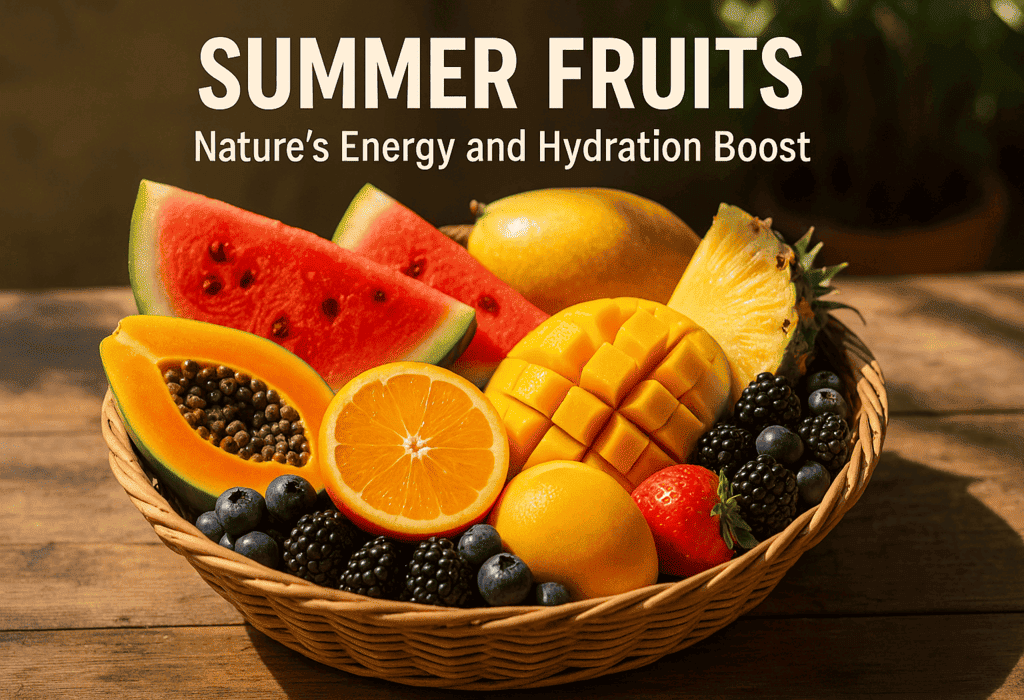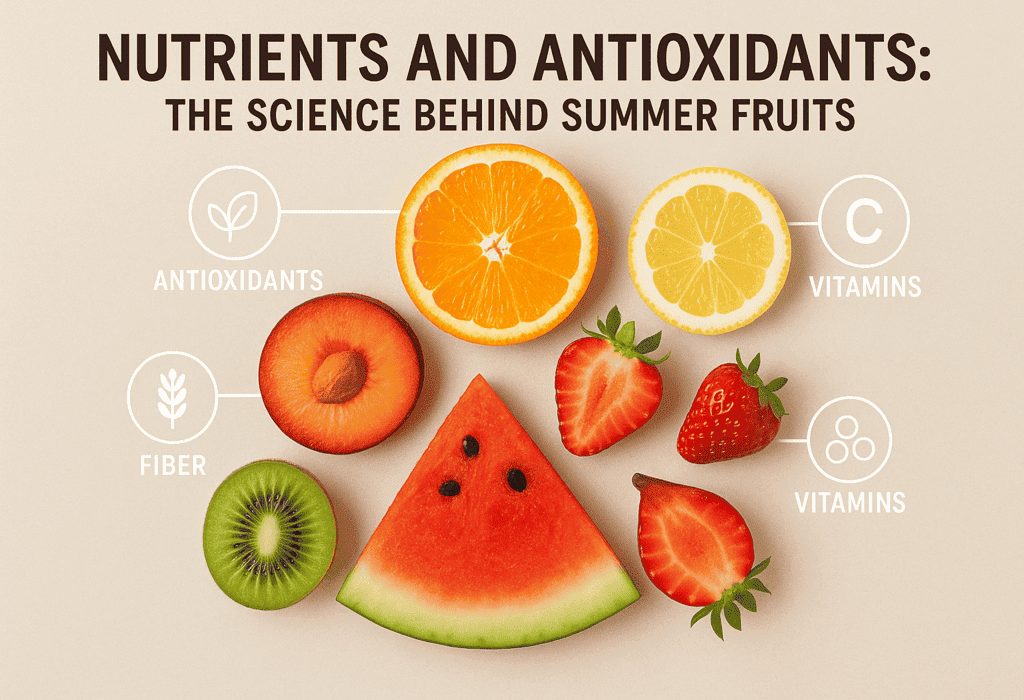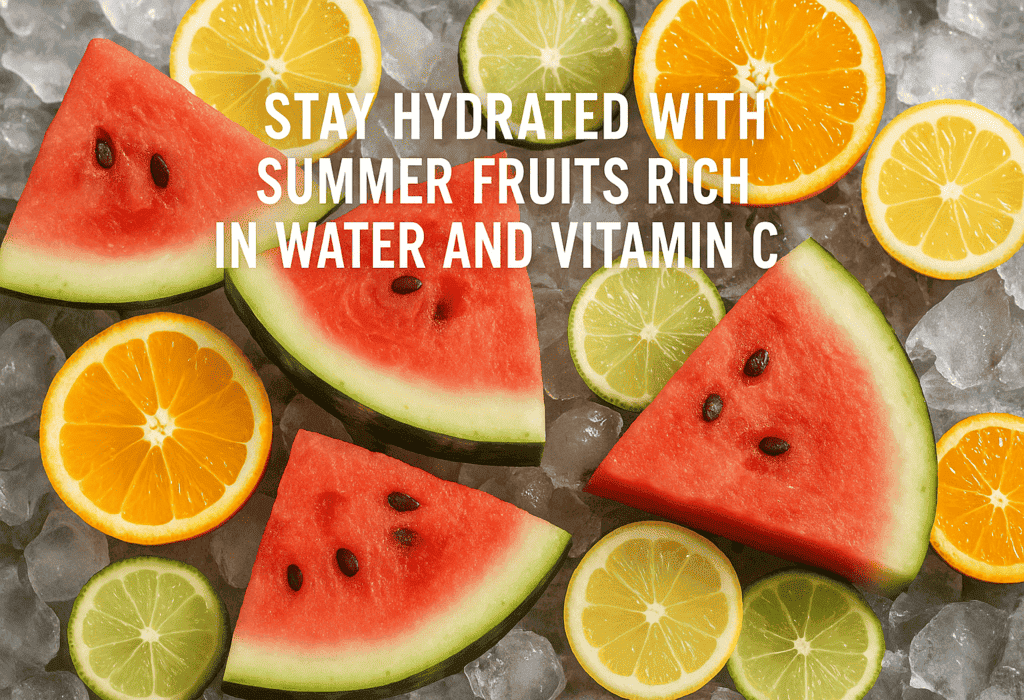
Introduction
Summer fruits are nature’s quick, delicious answer to rising temperatures, low energy, and the body’s extra demands during hot weather. Rich in vitamins, minerals, antioxidants, and plant phytonutrients, seasonal fruits such as mango, watermelon, orange, papaya, pineapple, and berries deliver concentrated nutrition with the added benefit of high water content — making them ideal for hydration, immune support, and overall wellness. This article is an evidence-informed, SEO-optimized guide to the science behind summer fruits, how they help your body, and practical tips to maximize their benefits. It includes key points, an easy nutrient table, references to recent scientific studies by prominent researchers across Asia, America, and Europe, and an accessible list of references for further reading.
Key Points
- Summer fruits are high in water content, helping natural hydration and electrolyte balance.
- They provide concentrated vitamin C, vitamin A precursors, potassium, fiber, and antioxidant phytonutrients (e.g., flavonoids, carotenoids, lycopene).
- Vitamin C and flavonoids contribute to immune function and reduce inflammation.
- Fruit proteases (e.g., papain, bromelain) aid digestion and may support gut health.
- Regular consumption of a variety of summer fruits supports cardiovascular health, skin health, and digestive function when included in a balanced diet.

The Nutritional Power of Summer Fruits
Summer fruits concentrate several essential nutrients in a naturally low-calorie package. The most noteworthy nutrients for health and performance are:
- Vitamin C — a potent antioxidant essential for immune cell function, collagen synthesis, and wound healing.
- Vitamin A (carotenoids) — supports vision and epithelial barrier integrity.
- Potassium — a key electrolyte for blood pressure regulation and nerve/muscle function.
- Dietary fiber — supports healthy digestion, satiety, and beneficial gut microbiota.
- Phytonutrients (flavonoids, lycopene, carotenoids) — linked to decreased inflammation and cardiovascular benefits.
A comparative snapshot of common summer fruits and select nutrients:
| Fruit | Vitamin C (mg/100 g) | Potassium (mg/100 g) | Water (%) | Top health benefits |
|---|---|---|---|---|
| Watermelon | 8 | 112 | ~92% | Hydration, lycopene for heart health. PMC |
| Mango | 36 | 168 | ~83% | Vitamin A/C, antioxidants; gut health benefits. PMC |
| Orange | 53 | 181 | ~87% | High vitamin C and flavonoids for immunity. Wiley Online Library |
| Papaya | 60 | 182 | ~88% | Papain enzyme — digestion and anti-inflammatory effects. PMC |
| Pineapple | 47 | 109 | ~86% | Bromelain protease — digestion support. PMC |
Data sources: USDA FoodData Central and peer-reviewed studies. (See References.) fdc.nal.usda.gov+1

Hydration and Electrolyte Balance : Nature’s Sports Drink
During summer, proper hydration is crucial. Many summer fruits are composed of 80–95% water, providing both fluids and electrolytes (notably potassium) that help restore what the body loses through sweat. Clinical and population studies show that incorporating water-rich fruits like watermelon and melon into the diet improves overall nutrient intake and supports hydration status, especially among older adults and children. Practical tip: pair fruit with a small source of protein or whole grain after heavy exercise to stabilize blood sugar and support recovery. PMCWatermelon Board
Immune Support : Vitamin C, Flavonoids, and Antioxidants
One of the best-documented roles of fruit-derived nutrients is immune support. Vitamin C concentrates in immune cells and supports functions such as phagocytosis and neutrophil motility. Major reviews and clinical analyses consistently report that adequate vitamin C intake shortens the duration of common respiratory infections and supports barrier defenses. In addition, flavonoids and other polyphenols, abundant in many summer fruits, have immunomodulatory and anti-inflammatory effects suggested by experimental and translational research — though human trials vary in design and size. These compounds work synergistically with vitamins and minerals to protect cells from oxidative stress and to regulate immune signaling. PMCFrontiers

Digestive Health : Enzymes, Fiber, and the Gut Microbiome
Certain tropical summer fruits, notably papaya (papain) and pineapple (bromelain), contain digestive proteases that help break down proteins and have demonstrated anti-inflammatory and gut-health benefits in laboratory and animal studies. Additionally, the dietary fiber in fruits helps maintain regular bowel movements and fosters a resilient gut microbiome — a cornerstone of long-term health. Recent human and mechanistic studies suggest that regular consumption of mango, for example, supports gut health markers and may have downstream benefits for metabolic health. PMC+1
Cardiovascular and Metabolic Benefits
Phytonutrients such as lycopene (notably in watermelon and pink grapefruit) and various polyphenols have been associated with improved vascular function, lower markers of oxidative stress, and favorable lipid profiles in short-term clinical trials. Some newer trials (including work on mango varieties) indicate promising effects on postprandial blood sugar and cholesterol markers, suggesting that whole-fruit inclusion may be a helpful part of dietary strategies for metabolic health. It’s important to view fruit as part of an overall balanced diet — whole fruits deliver fiber and nutrients that mitigate rapid blood sugar spikes often attributed to fruit sugars when consumed in isolation in large amounts. SciTechDailyEatingWell

How to Maximize Benefits : Timing, Pairing, and Storage
Best times to eat summer fruits:
- Morning — kick-start hydration and micronutrient intake.
- Post-exercise — replenish fluids and potassium.
- Between meals — a low-calorie, nutrient-dense snack that supports satiety.
Smart pairings: combine fruit with protein (Greek yogurt, nuts) or whole grains for better glycemic control and sustained energy.
Storage tips: keep fruits refrigerated when possible to slow spoilage; wash only before eating; store whole fruits intact until use to preserve nutrients and flavor.
Practical Recipes & Uses (Quick Ideas)
- Hydrating fruit salad: watermelon, cucumber, mint, and a squeeze of lemon.
- Post-workout smoothie: mango, banana, protein powder, and a handful of spinach.
- Digestive aid: papaya slices after a heavy protein meal.
- Refreshing snacks: chilled orange segments or frozen grapes for a low-calorie treat.
Evidence Summary : What Major Studies Say
- Vitamin C and immune function — comprehensive reviews show vitamin C supports immune cell functions and may reduce the duration of respiratory infections. (Authors and teams from prominent institutions across Europe and North America have contributed to this literature.) PMC+1
- Watermelon and dietary quality — population studies indicate watermelon consumers have higher overall diet quality and increased intake of key nutrients; clinical work links watermelon compounds with improved vascular responses. PMCSciTechDaily
- Mango and gut/metabolic health — randomized and observational studies show mango intake can favorably influence gut health markers and postprandial metabolic parameters. Research teams from North America and Asia have published these findings. PMC
- Proteolytic fruit enzymes (papain, bromelain) — bench and animal models, as well as clinical explorations, support the role of papain and bromelain in digestion and inflammation reduction. PMC+1
- Flavonoids and immune modulation — reviews and editorials summarize growing evidence that flavonoids modulate immune responses and inflammation, with research contributions from Europe, Asia, and the Americas. FrontiersPMC
Conclusion
Summer fruits are an accessible, delicious, and scientifically supported way to support hydration, immune resilience, digestive health, and metabolic balance. Incorporating a colorful variety—mango, watermelon, orange, papaya, berries, and pineapple—into your daily meals optimizes nutrient intake while providing natural hydration and phytonutrients that work synergistically for health. Aim for whole fruits rather than juices to retain fiber and slow sugar absorption. For most people, eating a range of seasonal fruits daily is a simple, safe, and effective habit that supports long-term health.
References (Selected)
- Carr, A. C., & Maggini, S. Vitamin C and Immune Function: A Review. (2017). PMC. PMC
- Alberts, A. Vitamin C: A Comprehensive Review of Its Role. (2025). PMC. PMC
- Fulgoni, K., et al. Watermelon Intake Is Associated with Increased Nutrient Intake and Diet Quality. (2022). PMC. PMC
- Asunción, P., et al. The effects of fresh mango consumption on gut health and related markers. (2023). PMC. PMC
- Kang, Y. M., et al. Papain Ameliorates Lipid Accumulation and Inflammation. (2021). PMC. PMC
- Kostiuchenko, O., et al. Effects of Proteases from Pineapple and Papaya on Protein Digestion and Gut Microbiota. (2022). PMC. PMC
- Hoskin, D. W. Editorial: Immune Modulation by Flavonoids. (2022). Frontiers in Immunology. Frontiers
- Singh, D. N., et al. Common foods for boosting human immunity: A review. (2023). Food Science & Nutrition. Wiley Online Library
- USDA FoodData Central — Nutrition database for fruit nutrient composition. fdc.nal.usda.gov+1
- Additional reviews and coverage: Healthline, EatingWell, and major public-health pages (Harvard T.H. Chan Nutrition Source). HealthlineEatingWell





